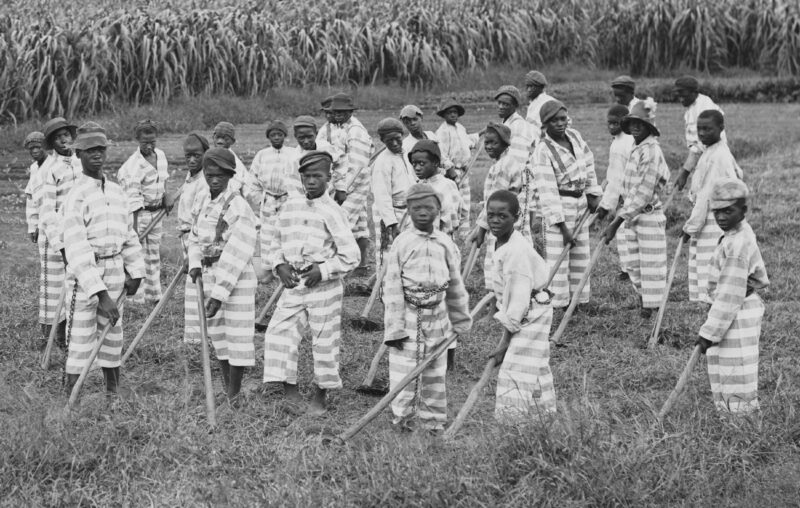Corporatism and Convict Leasing in the American South

Since the 1619 Project’s release, proponents of free markets have rightly pushed back on the claim that American capitalism is irrevocably linked to racism and slavery. In a recent Wall Street Journal op-ed, David Henderson and Phil Magness demonstrate that most of the injustice that was presented in episode three of the 1619 Project’s Hulu docuseries was perpetrated by governments, and was not the product of market capitalism. In fact, with the release of Black Liberation Through the Marketplace (which Marcus co-authored with Rachel Ferguson) it is obvious to us that many of the greatest atrocities committed against black Americans are the product of government policy – including perhaps the most egregious: convict leasing.
We have spent the last two years doing a deep dive into the convict leasing system in Alabama from its inception following the Civil War to its repeal in 1928. What we discovered was a corporatist scheme in which state governments partnered with private business to increase revenues, increase profits, and industrialize the South while criminalizing blackness and restoring (to the extent that they could) the racial hierarchies of the Antebellum South. Unlike capitalism (or free enterprise), which encourages competition in the market with minimum government intervention, corporatism is a system whereby the state picks winners and losers by granting subsidies, granting special privileges, or by establishing regulations that develop cartels within industries.
Although convict leasing had existed prior to Redeemer governments, once Democrats came back into power, they instituted Black Codes across the South. These codes, which included pig laws and vagrancy laws, meant that the jails and prisons in the region swelled with convicts—a disproportionate number of whom were black. The 13th Amendment had outlawed slavery, but it allowed for the leasing of prisoners to private businesses. The legal environment worked against black southerners and black men in particular were targeted for “carrying a weapon, riding on empty freight cars, speaking loudly in front of a white woman, ‘vagrancy’ (having no job or appearing to have no job), changing employers without permission, voting illegally, using obscene language, selling whiskey, selling cotton after sunset, and performing other either trivial or innocent activities.” Once charged, these men were usually convicted after a “trial” that frequently lasted only a few minutes. Indeed, an 1898 report found that for the majority of these men, the column where their charges should have been simply read “not listed.”
State and local authorities couldn’t afford to house these convicts, so they established the convict leasing system. Leasing offered the state advantages over the alternatives. After all, “it took the care and expense of thousands of prisoners out of the direct purview of the state [and] it provided a large pool of extremely cheap labor.” Southern industrialists in places like Birmingham, Alabama had a need for cheap labor, and the state just happened to have overflowing prisons. The answer must have seemed obvious. State and local governments began to lease convicts to a variety of industries including the mines in and around Birmingham. The state leased prisoners for very low fees and unlike free labor (which could mobilize and force negotiations) convicts could be forcibly disciplined to work in incredibly harsh environments and under horrid conditions.
The convict leasing system was a textbook example of corporatism. The industrialists profited from cheap labor, while the state lined its pockets and got to enforce racial hierarchies. By the mid-1880s, the burgeoning industrialists in Birmingham had leased “all the prisoners available in Alabama,” which amounted to several thousand at any given time. The two largest firms, the Pratt Coal and Iron Company and the Sloss Furnace Company, employed large numbers of prisoners—90 percent of which were black men. These two firms produced 20 percent of Alabama’s coal. Payments from these firms, as well as others, helped the struggling state government balance its books and by 1885 Alabama had around $85,000 on hand. County governments likewise benefited. The entire system was a racket by which private industrialists partnered with public actors to line their pockets by stealing the labor of predominantly black prisoners.
The conditions that many of these convicts worked in were horrific, without any market competition or threat of unionization. Sources from the time report that convicts in the Pratt mines huddled together in “foul accommodations,” where “the water was impure, the meat consisted primarily of fat, and pneumonia, typhoid, and diarrhea were prevalent.” The conditions were even worse at the Sloss mines. The health of the convicts was “very bad and the mortality great.” But the company argued that the state was at least partially responsible for this as the men who arrived were “usually filthy and covered with vermin and frequently sick.” Ultimately, both the state and the companies were responsible for the high levels of death. The men often worked from three in the morning until eight in the evening and faced whippings and even torture if they didn’t stay busy. By 1879, just four years after the leasing program began, 40 percent of prisoners had died in custody. Despite some attempts at reform, mortality rates remained high three decades later when the head of the Board of Inspectors of Convicts exclaimed that “if the state wishes to kill its convicts it should do it directly and not indirectly.”
It’s important to remind readers, and Americans, that this was not a product of capitalism, it was the direct consequence of government’s colluding with business to prevent a market for labor. This was state directed, and both parties benefited. In 1883, the Pratt mine’s paymaster concluded “that the company’s convict laborers, with leasing fees and the cost of housing, food, and supervision taken into account, excavated coal for 6-7 cents per ton compared with 50 cents for free labor.” Furthermore, a survey by the U.S. Commissioner of Labor established that “Birmingham convicts cost 39 cents per day compared with $1.75 for non-convict labor.” The survey also found that the convicts carried out “more work than free labor.”
Both local and state governments benefited. Local law enforcement “depended on the leasing system for a substantial part of their income (they pocketed the fines and fees associated with these ‘convictions’).” In fact, the South was so desperate for revenue “that renting out convicts became a chief way to fund prisons and maintenance. In a report published in 1900, the inspector of convicts for the state concluded that “Alabama had the most profitable system of prisons in the entire United States.”
The free market did not charge, convict, or punish black convicts for trumped up charges—racialized state governments did. The convict leasing system required a “degree of intimate collusion between industrial, commercial, and agricultural enterprises and the law enforcement system” to succeed in robbing black southerners of their liberty. This type of coercion simply isn’t possible without the police power of the state. It’s long past time that academics stop conflating capitalism with corporatism. At best, they are ignorant. At worst, they are being purposefully dishonest. The truth is that government (at all levels) has been to blame for the worst episodes of injustice perpetrated against black Americans.












